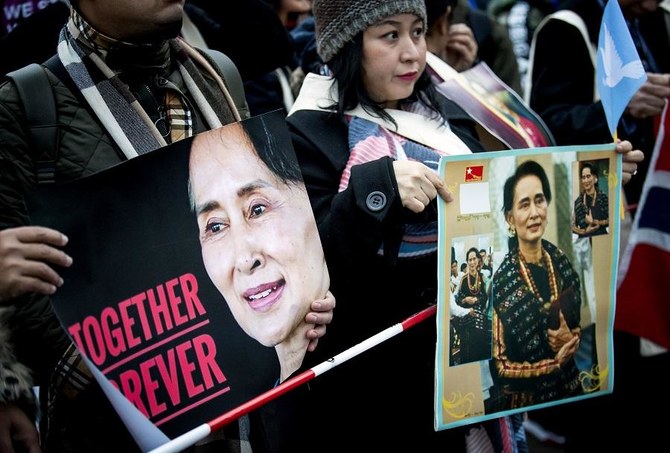DHAKA: Bangladesh and members of the Rohingya community on Thursday welcomed a ruling from the International Court of Justice (ICJ) ordering Myanmar to prevent a genocide against the Muslim minority group.
Bangladesh hosts more than 1.15 million Rohingya refugees at 34 camps in the city of Cox’s Bazar. Most fled from Myanmar’s northern Rakhine State following a brutal military crackdown.
The ICJ’s judge Abdul Qawi Ahmed Yusuf, said the court believed the Rohingya in Myanmar remained extremely vulnerable and that the country must “take all measures within its power to prevent the commission of all acts” that constitute genocide under the 1948 UN Genocide Convention.
The court also ruled that the Myanmar government should “take effective measures to prevent the destruction and ensure the preservation of evidence related” to the allegations of genocide. The case against Myanmar for violating the convention was filed in November by Gambia, on behalf of the Organization of Islamic Cooperation (OIC).
Members of the Rohingya community welcomed the verdict.
“The court order will partially serve our purposes at the moment, and it’s a victory for us,” said Nay San Lwin, co-founder of the Free Rohingya Coalition.
“Still, we have a long way to go. But, for the first time in the history of our oppression, we got a court order to protect the Rohingyas and it is directed at both the military and Myanmar government. This is a great day for Rohingyas. We thank Gambia for taking this case to the world’s highest court.”
Sayed Ullah, secretary of the Arakan Rohingya Society for Peace and Human Rights, praised the decision of the 17-judge panel and said that it was a “big win” for all of the Rohingya in Bangladesh.
Bangladeshi Foreign Minister A.K. Abdul Momen said the ruling would stop the recurrence of ethnic cleansing and genocide in the world.
“A victory for humanity, a milestone for human rights activists across all nations. A victory for Gambia, OIC, the Rohingya and of course, for Bangladesh,” he added in the statement.
The ICJ set a four-month deadline for Myanmar to comply with the verdict and ordered it to submit reports on progress every six weeks. It would be tough for Myanmar to disregard the court order, said Prof. Amena Mohsin from the University of Dhaka, as the UN Security Council would try to implement the court’s guidelines and apply pressure on Myanmar’s allies China and Russia.
“Myanmar has taken the ICJ proceedings very seriously, otherwise they would not have sent Aung San Suu Kyi to defend the allegations against the country,” she told Arab News.
“Besides, on Tuesday, a Myanmar commission also admitted that during the military crackdown in August 2017, there might have been some war crimes against the Rohingyas, which is also a significant development.”
Buddhist-majority Myanmar considers the Rohingya to be “Bengalis” from Bangladesh even though their families have lived in the country for generations. Nearly all of them have been denied citizenship for decades, and they are also denied freedom of movement and other basic rights.
Ambassador Touhid Hossain, former foreign secretary of Bangladesh, described the ICJ verdict as a moral victory.
“I expect that Myanmar will comply with the court order and it will submit development reports to the ICJ according to the guidelines,” he told Arab News.
“But the reality is that for ICJ there is no enforcement mechanism to check the reality on the ground.”
China, Russia and to some extent India may try to stop Myanmar from making the situation worse so there were no further allegations, he added.
In Aug. 2017, when the military launched what it called a clearance campaign in Rakhine State in response to an attack by a Rohingya insurgent group, more than 700,000 Rohingya fled to Bangladesh. There were accusations that security forces committed mass rapes, killings and burned thousands of homes.
Bangladesh has been waiting for a green light from UN inspectors to start the controversial relocation of 100,000 Rohingya refugees to a newly built $275 million island camp.
Although Dhaka says the tiny island of Bhasan Char is ready to begin receiving families, UN technical experts have yet to carry out health and safety checks.
Bhasan Char is located in the Bay of Bengal and was formed with Himalayan silt in 2006.
Several international rights organizations have urged Bangladesh not to relocate the Rohingya to the island due to it being in an area prone to cyclones.
One senior diplomat warned that a court verdict was not enough to alleviate the Rohingyas’ suffering.
“Myanmar’s complying with the court order will not bring the ultimate solution to the Rohingya crisis,” Humayun Kabir told Arab News.
“Myanmar should have some social and political willingness to repatriate the more than one million Rohingyas who resorted to Bangladesh.”
The court rejected Myanmar’s request to drop the genocide case from its proceedings.


























